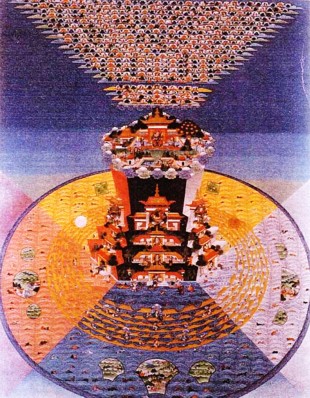Form realm: Difference between revisions
Jump to navigation
Jump to search
No edit summary |
mNo edit summary |
||
| (12 intermediate revisions by 4 users not shown) | |||
| Line 1: | Line 1: | ||
[[Image:Mount Meru Continents.jpg|frame|Mount Meru surrounded by the continents and subcontinents, with the gods of the Desire and Form Realms above]]'''Form realm''' (Skt. ''rūpadhātu''; [[Wyl.]] ''gzugs khams'') — the second of the [[three realms]], only 'populated' by [[gods]] and divided into seventeen heavens. The cause for being reborn in one of these heavens is the favourable [[karma]] accumulated through the practice of one of the [[four dhyanas]], each 'causal meditative [[dhyana]]' acting as a cause of rebirth in one of the corresponding 'resultant dhyana levels'. | [[Image:Mount Meru Continents.jpg|frame|Mount Meru surrounded by the continents and subcontinents, with the gods of the Desire and Form Realms above]]'''Form realm''' (Skt. ''rūpadhātu''; Tib. [[གཟུགས་ཁམས་]], ''zuk kham'', [[Wyl.]] ''gzugs khams'') — the second of the [[three realms]], only 'populated' by [[gods]] and divided into seventeen heavens. The cause for being reborn in one of these heavens is the favourable [[karma]] accumulated through the practice of one of the [[four dhyanas]], each 'causal meditative [[dhyana]]' acting as a cause of rebirth in one of the corresponding 'resultant dhyana levels'. | ||
==Seventeen Heavens of the Form Realm (Skt. ''rupadhatuvasiñjati''; Tib. [[གཟུགས་ཁམས་གནས་རི་བཅུ་བདུན་]], Wyl. ''gzugs khams gnas ri bcu bdun'')== | |||
== | ===Five Pure Heavens (Tib. [[གཙང་གནས་ལྔ་]], ''gtsang gnas lnga'')=== | ||
{{:Five Pure Heavens}} | |||
''Note'': the five pure heavens are also a result of the fourth dhyana meditation, but are only accessible to [[arya|noble beings]]. | |||
===Fourth Dhyana (Tib. [[བསམ་གཏན་བཞི་པ་]], ''bsam gtan bzhi pa'')=== | |||
*[[Great Fruition]] (Skt. ''Bṛhatphala''; Tib. [[འབྲས་བུ་ཆེ་]], ''‘bras bu che'') | |||
*Increasing Merit (Skt. ''Puṇyaprasava''; Tib. [[བསོད་ནམས་འཕེལ་]], ''bsod nams ‘phel'') | |||
*Cloudless (Skt. ''Anabhraka''; Tib. [[སྤྲིན་མེད་]], ''sprin med'') | |||
'' | ===Third Dhyana (Tib. [[བསམ་གཏན་གསུམ་པ་]], ''bsam gtan gsum pa'')=== | ||
*Most Extensive Virtue (Skt. ''Śubhakṛtsna''; Tib. [[དགེ་རྒྱས་]], ''dge rgyas'') | |||
*Immeasurable Virtue (Skt. ''Apramāṇaśubha''; Tib. [[ཚད་མེད་དགེ་]], ''tshad med dge'') | |||
*Lesser Virtue (Skt. ''Parīttaśubha''; Tib. [[དགེ་ཆུང་]], ''dge chung'') | |||
===Second Dhyana (Tib. [[བསམ་གཏན་གཉིས་པ་]], ''bsam gtan gnyis pa'')=== | |||
*Clear Radiance (Skt. ''Ābhāsvara''; Tib. [[འོད་གསལ་]], ''‘od gsal'') | |||
*Immeasurable Radiance (Skt. ''Apramāṇābha''; Tib. [[ཚད་མེད་འོད་]], ''tshad med ‘od'') | |||
*Lesser Radiance (Skt. ''Parīttābha''; Tib. [[འོད་ཆུང་]], ''‘od chung'') | |||
===First Dhyana (Tib. [[བསམ་གཏན་དང་པོ་]], ''bsam gtan dang po'')=== | |||
*Great Brahma (Skt. ''Mahābrahmaṇa''; Tib. [[ཚངས་པ་ཆེན་པོ་]], ''tshangs pa chen po'') | |||
*Priests of Brahma (Skt. ''Brahmapurohita''; Tib. [[ཚངས་པ་མདུན་ན་འདོན་]], ''tshangs pa mdun na ‘don'') | |||
*[[Heaven of Brahma]] (Skt. ''Brahmakāyika''; Tib. [[ཚངས་རིས་]], ''tshangs ris'') | |||
=== | |||
*Great Brahma (Skt. ''Mahābrahmaṇa''; ''tshangs pa chen po'') | |||
*Priests of Brahma (Skt. ''Brahmapurohita''; ''tshangs pa mdun na ‘don'') | |||
*Heaven of Brahma (Skt. ''Brahmakāyika''; ''tshangs ris'') | |||
[[Category:Key Terms]] | [[Category:Key Terms]] | ||
[[Category:Places]] | [[Category:Places]] | ||
[[Category:Three Realms]] | [[Category:Three Realms of Samsara]] | ||
[[Category:God Realm]] | |||
[[Category:Form realm| ]] | |||
Latest revision as of 08:09, 14 September 2023

Form realm (Skt. rūpadhātu; Tib. གཟུགས་ཁམས་, zuk kham, Wyl. gzugs khams) — the second of the three realms, only 'populated' by gods and divided into seventeen heavens. The cause for being reborn in one of these heavens is the favourable karma accumulated through the practice of one of the four dhyanas, each 'causal meditative dhyana' acting as a cause of rebirth in one of the corresponding 'resultant dhyana levels'.
Seventeen Heavens of the Form Realm (Skt. rupadhatuvasiñjati; Tib. གཟུགས་ཁམས་གནས་རི་བཅུ་བདུན་, Wyl. gzugs khams gnas ri bcu bdun)
Five Pure Heavens (Tib. གཙང་གནས་ལྔ་, gtsang gnas lnga)
- Unexcelled
- Extreme Insight/Great Vision (Skt. Sudarśa; Tib. ཤིན་ཏུ་མཐོང་, Wyl. shin tu mthong)
- Perfect Appearance/The Marvellous (Skt. Sudṛśa; Tib. གྱ་ནོམ་སྣང་བ་, Wyl. gya nom snang ba)
- The Painless/Without Distress (Skt. Atapa; Tib. མི་གདུང་པ་, Wyl. mi gdung pa)
- The Slightest/Not So Great (Skt. Abṛha; Tib. མི་ཆེ་བ་, Wyl. mi che ba)
Note: the five pure heavens are also a result of the fourth dhyana meditation, but are only accessible to noble beings.
Fourth Dhyana (Tib. བསམ་གཏན་བཞི་པ་, bsam gtan bzhi pa)
- Great Fruition (Skt. Bṛhatphala; Tib. འབྲས་བུ་ཆེ་, ‘bras bu che)
- Increasing Merit (Skt. Puṇyaprasava; Tib. བསོད་ནམས་འཕེལ་, bsod nams ‘phel)
- Cloudless (Skt. Anabhraka; Tib. སྤྲིན་མེད་, sprin med)
Third Dhyana (Tib. བསམ་གཏན་གསུམ་པ་, bsam gtan gsum pa)
- Most Extensive Virtue (Skt. Śubhakṛtsna; Tib. དགེ་རྒྱས་, dge rgyas)
- Immeasurable Virtue (Skt. Apramāṇaśubha; Tib. ཚད་མེད་དགེ་, tshad med dge)
- Lesser Virtue (Skt. Parīttaśubha; Tib. དགེ་ཆུང་, dge chung)
Second Dhyana (Tib. བསམ་གཏན་གཉིས་པ་, bsam gtan gnyis pa)
- Clear Radiance (Skt. Ābhāsvara; Tib. འོད་གསལ་, ‘od gsal)
- Immeasurable Radiance (Skt. Apramāṇābha; Tib. ཚད་མེད་འོད་, tshad med ‘od)
- Lesser Radiance (Skt. Parīttābha; Tib. འོད་ཆུང་, ‘od chung)
First Dhyana (Tib. བསམ་གཏན་དང་པོ་, bsam gtan dang po)
- Great Brahma (Skt. Mahābrahmaṇa; Tib. ཚངས་པ་ཆེན་པོ་, tshangs pa chen po)
- Priests of Brahma (Skt. Brahmapurohita; Tib. ཚངས་པ་མདུན་ན་འདོན་, tshangs pa mdun na ‘don)
- Heaven of Brahma (Skt. Brahmakāyika; Tib. ཚངས་རིས་, tshangs ris)